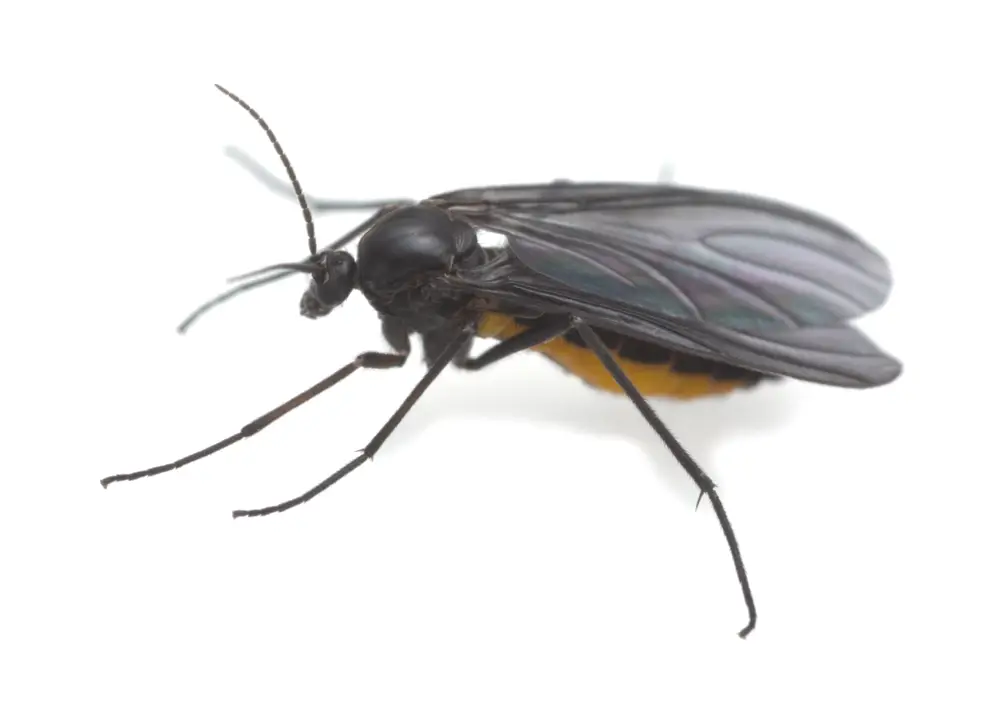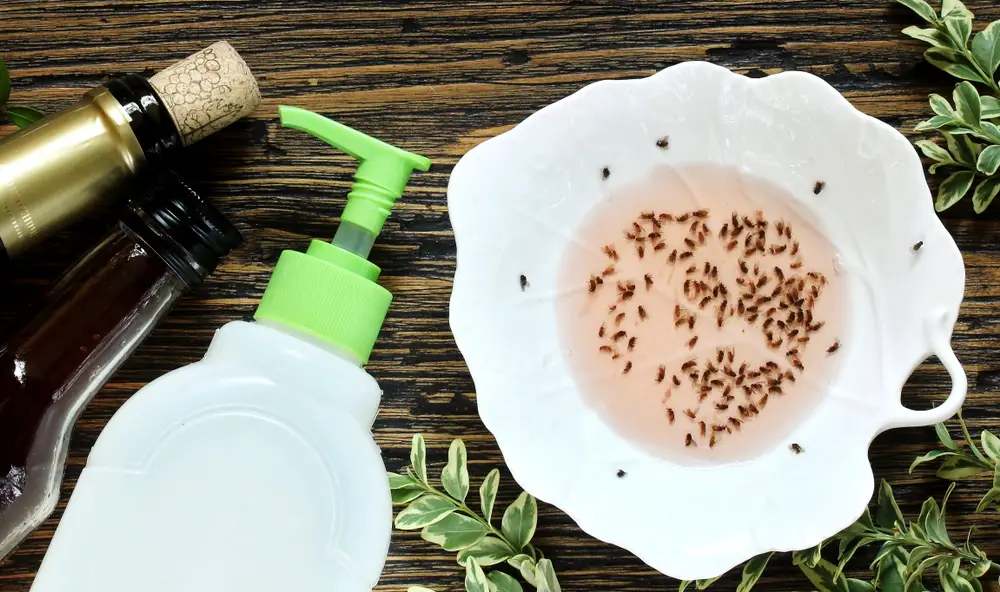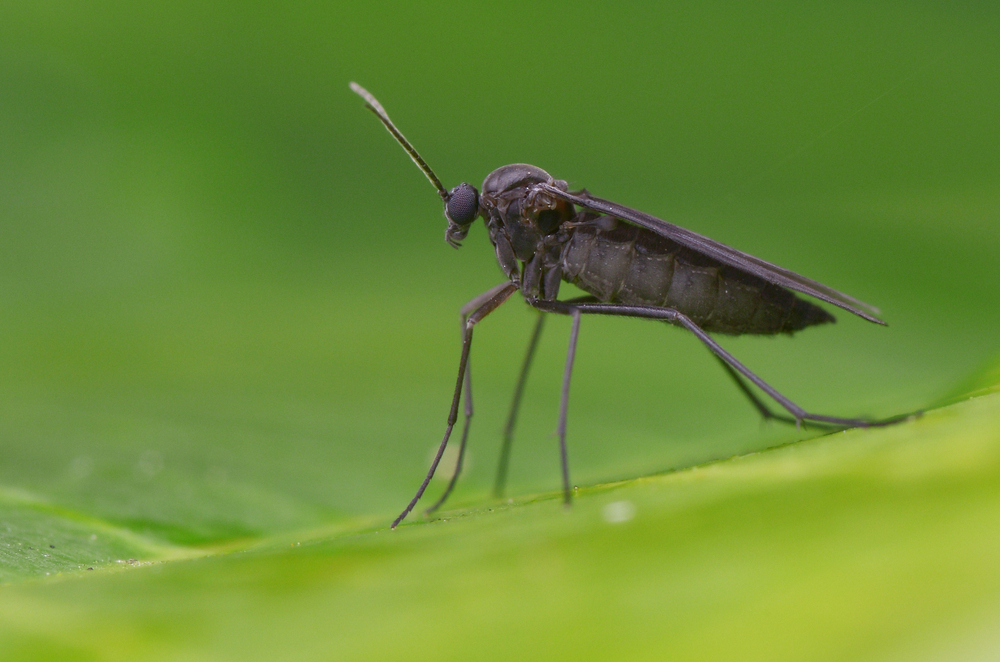Do you ever wonder why gnats fly in your face? It seems like they are just trying to annoy us! In reality, there is a reason why these little pests fly into our faces.
Gnats are attracted to the CO2 we exhale, and they use our faces as a landing strip because it is close to the ground.
This blog post will discuss why gnats fly in your face and what you can do to get rid of them!
What Are Gnats?

If you’ve ever been outside on a summer day and felt something flying around your head, it was a gnat. Gnats are small, fly-like insects that can be found in many different environments.
While they are not known to carry disease, they can be a nuisance. There are several different types of gnats, including fruit flies and midges. Gnats are attracted to the smell of fruits and vegetables, which is why they are often found in kitchens.
They are also drawn to the CO2 that we exhale is why gnats tend to hover around our heads. In addition to being annoying, gnats can also damage crops.
When they land on fruits and vegetables, they can leave behind bacteria that can cause rot. As a result, taking steps to control gnats in your home or garden is essential.
There are several different ways to do this, including using traps and insecticides.
These measures can help keep your home or garden free of these pesky insects.
Why Do Gnats Fly In Your Face?
We’ve all had the experience of flying insects right into our faces, and it’s not a pleasant one.
But have you ever wondered why bugs seem so attracted to our faces? It turns out that there are a few reasons for this.
For one thing, our faces are usually warmer than the rest of our body as blood vessels are close to the skin’s surface. This warmth is especially pronounced around our eyes and mouth, two of the most common places for bugs to fly into.
In addition, we release more CO2 when we breathe, and this gas is also attractive to many insects.
Finally, it’s worth noting that we often move our faces more than other parts of our bodies. It makes us more likely to accidentally swat at a bug that comes too close.
So next time a bug flies into your face, remember that it’s not personal – they’re just following their instincts!
The Science behind Why Gnats Are Attracted To Carbon Dioxide
Have you ever wondered why gnats are so attracted to CO2? It turns out that there’s a scientific explanation for this behavior.
Gnats are attracted to CO2 because they’re attracted to the scent of human breath – they’re seeking out a source of food. When gnats sense carbon, they know that there’s a potential food source nearby.
This is because CO2 is produced by all animals as a result of respiration. In other words, when animals breathe out, they’re releasing CO2into the air.
This gas is then detected by gnats, which leads them to swarm around the animal in search of food.
So the next time you see a group of gnats hovering around your head, remember that they’re after your CO2!
Why Do Gnats Try To Fly In Your Eyes?
Gnats are tiny, persistent pests that seem to be drawn to your face, especially your eyes. While gnats can be annoying, they’re actually relatively harmless.
So, why do they try to fly into your eye? Gnats will have justified reasons for this too.
There are a few reasons why gnats might be attracted to your eyes.
- First, your eyes are a source of heat. Gnats are attracted to warmth, so they’re naturally drawn to your face.
- Second, your eyes are a source of moisture. Gnats are attracted to moist soil and are drawn to your tears and sweat.
- Finally, your eyes are a source of CO2. Gnats are attracted to the CO2 you exhale, so they’re naturally drawn to your face.
While gnats can be annoying, there’s no need to worry about them. They’re not harmful, and they won’t cause any damage to your eyes.
So, the next time you find a gnat flying around your head, just remember that it’s only trying to find a warm place to land!
Why Do Gnats Fly In Your Nose?
Have you ever been outside on a warm day, only to have a gnat fly up your nose? It’s happened to the best of us.
But why do gnats do this? Gnats are tiny insects attracted to warm, moist places – like your nose. When they sense someone nearby, they fly towards them, hoping to find a good spot to land.
Unfortunately for us, our noses fit the bill perfectly. In addition, our breathing provides a steady stream of air that keeps gnats airborne, making it easy for them to end up right where we don’t want them.
While it may be annoying, there’s no need to worry about gnats flying up your nose. They’re not after your blood and won’t lay their eggs in there (despite what urban legends might say).
So the next time you feel a gnat buzzing around your head, just remember – it’s not personal.
How Can We Get Rid Of Gnats For Good?

There’s nothing more annoying than a fungus gnat flying around your head while trying to enjoy a nice summer day.
But did you know that those little buggers can actually pose a serious threat to your health?
Fungus gnats are known to spread diseases like malaria and yellow fever, so getting rid of them for good is essential.
Fortunately, there are a few simple things you can do to keep gnats naturally away.
- First, ensure you don’t have any standing water around your home, as gnats love to breed in stagnant water or potted plants.
- You should also keep trash cans and pet food bowls clean and covered, as these can attract gnats.
Finally, try setting out some traps made with apple, cider, vinegar, or sugar water, which will lure the gnats into a sticky death. They are natural gnat repellants, and their natural scent can help you repel gnats and other pesky flies.
With vigilance, you can keep your home gnat-free all summer long!
Final Thoughts On Why Gnats Fly In Our Faces
We may never know why gnats are attracted to our faces, but there are a few theories. One possibility is that they mistake our faces for flowers. Another option is that they’re drawn to the carbon dioxide we exhale.
Whatever the reason, gnats can be a nuisance. Fortunately, there are a few things you can do to keep them away.
If you’re outside, try to avoid standing near stagnant water or areas with lots of vegetation. If you’re inside and gnat bites, make sure to use olive oil, coconut oil, vegetable oil, and other essential oils.
You can also try using a mosquito trap or wearing light-colored clothing.
Taking a few simple precautions allows you to enjoy your time outdoors without being bothered by gnats.
Keep Reading:
Where Do Dragonflies Go When It Rains?
Driven by a passion for those tiny creatures that rule our world, we at Bug Domain strive to be your go-to resource for information on insects.



